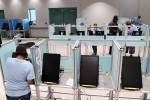Police giving drivers chance to adjust to new cellphone law
The combination of a cellphone and a car are as vital to Kolleen Kelley's profession as a purseful of well-designed business cards and an extroverted personality.
Kelley is a Realtor and president-elect of the Greater Las Vegas Association of Realtors. Every workday, Kelley's job requires her to field a nearly nonstop stream of calls from clients and colleagues, and she fields many of them while driving her car.
But, in June, Kelley, a Realtor for 25 years, realized that she would have to revise her carefully choreographed ballet of telecommunication and transportation when Gov. Brian Sandoval signed Senate Bill 140, which prohibits motorists from talking on hand-held cellphones or texting while driving.
Kelly has spent the past several months trying out hands-free devices for her phone and, finally, found a Bluetooth earpiece that connects wirelessly to her cellphone. And, it turns out, she loves it so much that she even uses it at home.
"I was forced into it, but now I love it," Kelley admits.
The new law is aimed at reducing accidents associated with distracted driving. Police can pull over and cite a driver they see using a hand-held phone. Fines are set at $50 for a first offense, $100 for a second offense and $250 for third and subsequent offenses.
However, starting Saturday and continuing through Dec. 31, police will warn, not cite, offenders. And that makes the next three months an ideal time for drivers to not only wean themselves from a hand-held lifestyle, but rethink what it is they're doing, and shouldn't be doing, behind the wheel.
Concerns about new technologies that might drive motorists to distraction are nothing new. Jim Travers, Consumer Reports' associate editor for automobiles, notes that "back in the 1930s, when car radios first started becoming prevalent, there was a movement afoot to ban their use because it would encourage something called, 'one-armed driving.' "
Today, however, the roster of potential in-car distractions drivers face include not just radios (and now of the AM, FM and satellite variety), but mp3 players connected to car speakers, navigation systems, in-car video players and console displays that can update drivers on their Facebook pages, the news or the weather.
Of course, driver distractions can be low-tech, too. The National Highway Traffic Safety Administration also cites as examples of common driver distractions eating and drinking, talking to passengers, grooming and reading maps or other materials.
The safety administration breaks down "distracted driving" into three categories: visual distraction, when the driver takes his or her eyes off of the road; manual distraction, when the driver takes his or her hands off of the wheel; and cognitive distraction, when drivers "take their minds off of what they're doing."
Erin Breen, director of the Safe Community Partnership Program at the University of Nevada, Las Vegas, notes that when drivers use cellphones to send or receive text messages or conduct conversations while driving, they're concocting a trifecta of driving distractions: They're taking their eyes off of the road to attend to the device; they're driving with only one hand while they work the device; and they're so busy using the device that their minds no longer are fully on their driving.
And when drivers become distracted, things can turn ugly quickly. According to Travers, studies have shown that taking one's eyes off of the road for just two seconds doubles the likelihood of being in a crash.
This increased risk of accidents because of driver inattention is associated with drivers of all ages, including younger drivers who may pride themselves on their ability to multitask.
Mobile carriers have been among the most avid proponents of cellphone driving and texting bans.
"Absolutely, we are in favor of responsible driving," says Jenny Weaver, spokeswoman for Verizon Wireless. "We've said for years to our customers and our employees that, when you're behind the wheel, safe driving is your responsibility and should always be your first priority."
Weaver notes that consumer interest in hands-free cellphone devices does tend to increase when states enact legislation banning hand-held cellphone use when driving. But, she says, "even before (the Nevada law), people had an interest in having access to their phones hands-free."
Verizon's hands-free options range from wired headsets for $25 or so to Bluetooth devices that can range in price from $40 for an earpiece to a speaker that can be clipped to a visor for about $100 to premium speakers that run about $170.
In addition, many automakers now include Bluetooth systems as part of their cars' entertainment systems. Drivers can pair their phones with the systems, then carry on conversations while still keeping both hands on the wheel.
But, beyond technological fixes, adapting to a distraction-free motoring lifestyle requires drivers to change their behavior.
"The advice we give people certainly is fairly obvious," Travers says: Make calls, send texts and answer messages before driving off; don't program navigational systems on the fly but, rather, before leaving; and "take care of any personal grooming needs before you get behind the wheel."
Nevada is the 31st state to adopt a ban on texting by drivers of all ages and the ninth to outlaw the use of cellphones without hands-free devices. Breen says the law may not go far enough, but does represent "a step in the right direction."
"It's not a be-all and end-all because the reality is, it still allows people to use their phones and, truthfully, I don't know if that's ever going to change," Breen says.
"What we hope is that people will take this opportunity to discover that you certainly can drive in your car without using your phone."
Contact reporter John Przybys at jprzybys@ reviewjournal.com or 702-383-0280.
Driving distractions grow more sophisticated
So why, at a time when safety advocates and state legislators are working to limit the use of cellphones by drivers, are automakers packing dashboard consoles with even more complicated electronic devices?
In its October 2011 issue, Consumer Reports offers a comprehensive look at the expanding array of services auto manufacturers are incorporating into their vehicles.
The magazine notes, drivers not only can listen to their radios while driving, but use built-in electronic devices to post an entry on their Facebook page, find a restaurant, check stock quotes and even check out a search engine, all in the spot in the dash where a simple radio used to be enough of a distraction.
Jim Travers, Consumer Reports' associate editor for automobiles, agrees that this trend toward increasing in-car gadgetry does seem to go against the current legislative grain.
"Talking to car manufacturers, representatives from several of them told us the same thing: They're kind of between a rock and a hard place, because people are going to perform these functions and people are going to engage in these activities behind the wheel," Travers says.
So if one auto manufacturer doesn't offer such devices as a feature, buyers will go to another manufacturer that does.
"The question then becomes: What is the safest way to do it with the least risk?" Travers notes. "And I think various manufacturers with these new connected systems are approaching it in different ways."
The magazine notes that most manufacturers employ voice interfaces by which messages are read to and then dictated by the driver. However, the magazine says Hyundai's Blue Link system will allow the driver only to dictate and send text messages by voice and not receive them, while Toyota's Entune system enables the driver to full use of the full array of its apps only when the car is not moving.
A related issue is that even familiar in-car devices are becoming increasingly complicated to operate. For example, Consumer Reports found that it took five steps and five seconds to select a radio station preset in one new car, six steps and 10 seconds to tune a radio manually to a specific frequency in another, and six steps and 11 seconds to play an iPod through a car's built-in USB port in yet another.
So, Travers says, "it definitely seems like a double whammy."
By JOHN PRZYBYS





























